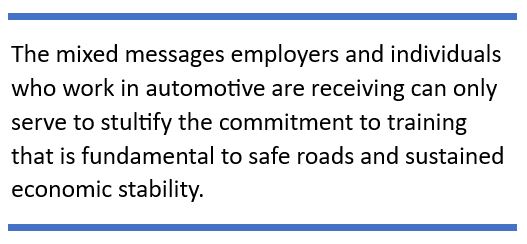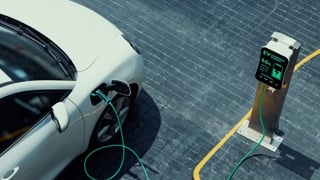After UK prime minister Rishi Sunak suddenly eased off the 2030 deadline for final sales of petrol and diesel new cars last week to 2035, Steve Nash, chief executive of the Institute of the Motor Industry (IMI) shares an urgent warning about a fundamental risk to automotive aftermarket services in the coming years.
Very quickly following Wednesday’s late afternoon pronouncement by the Prime Minister, the light dawned on those of us working in automotive that there was a serious disconnect. A sector that had already been working hard to overcome a lack of any clear strategy for the 2030 deadline now finds itself caught between a rock and a hard place.
The shift to 2035 for the ban on the sale of new ICE vehicles will certainly dampen adoption of EVs. Yet manufacturers must still meet the ever-building UK ZEV target.
It’s already causing concern for 2024 with demand unlikely to match the 22% target for all vehicle sales, with the potential consequence that manufacturers will simply reduce production/import of ICE vehicles in order to avoid the eye-watering £15,000 per vehicle fine. A dampening of the new car market as a whole is something we were all hoping we’d seen the end of since COVID.
 However, there’s another concern that has much more serious consequences for the UK automotive sector.
However, there’s another concern that has much more serious consequences for the UK automotive sector.
The mixed messages employers and individuals who work in automotive are receiving can only serve to stultify the commitment to training that is fundamental to safe roads and sustained economic stability. It is very likely that fleet buyers – currently accounting for 50% of new EV sales - will be the mainstay of demand for the new drivetrain in the next few years, encouraged by corporate ESG targets and a long-term view.
But, if automotive employers and their workforce can’t see the immediate return on investment of EV training because of lack of consumer buying confidence, the already critical skills gap will only widen and we could find the wait times for repairs extending even further than they are already.
That can’t be good news for the UK economy and social mobility.
The fact of the matter is that the automotive aftermarket must stay focused on upskilling for EVs; it also needs to maintain continuous professional development for ICE vehicles.
The franchised sector probably has the greatest motivation to keep their foot on the pedal on both technologies. However, when it comes to independent garages there will, understandably, be considerable nervousness to commit training to a drivetrain that could easily be 10 years down the road before it comes through their doors.
Busy as a consequence of the pandemic, with the average age of vehicles in the parc increasing to 10+ years, and facing a significant skills gap, they are already struggling to manage demand. As such, there’s little reason for them to prioritise training right now on electric vehicles.
It’s imperative, therefore, that having made this monumental decision to u-turn on the 2030 target, the government thinks very carefully about how it ensures UK infrastructure remains effectively supported by the automotive aftermarket.
Author: Steve Nash, chief executive, Institute of the Motor Industry




















Login to comment
Comments
No comments have been made yet.